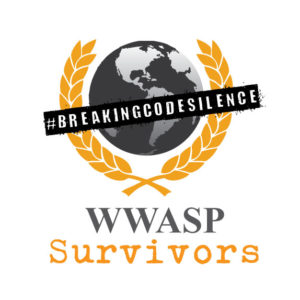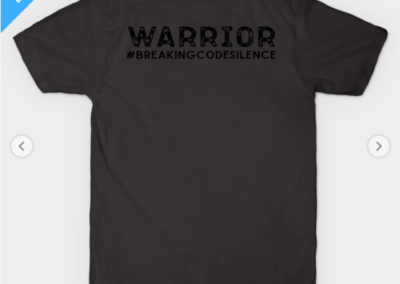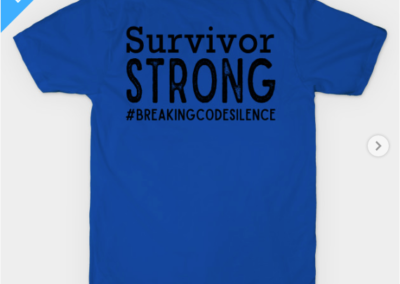In this post, we will examine the testimony of Cheyenne Jerred. She was the staff member whom the sexual abuse victim opened up to and who ultimately blew the lid off everything that was happening at Midwest Academy when she reported everything to DHS. As with all of the testimony, we will highlight some of the things we found interesting here and link to the full testimony on the bottom.
According to Cheyenne, the staff didn’t get any special training. She finally received some restraint training about halfway through her time there.
Q. Did you receive any special training for your position?
A. About halfway through working there, we had some restraint training, and that’s about it.
Q. Did you have any mandatory child abuse training?
A. No.
Q. Did you have any background or training in child hood development?
A. No.
Q. You had a high school diploma?
A. Yes.
Q. Had you ever had specific training working with the children?
A. No.
Cheyenne remembered OSS and how children couldn’t get out if the door was shut. According to her, the doors were only removed because DHS told Midwest Academy that they had to remove them.
Q. And you said once the door is shut, there is no way to get out?
A. Yes. I know at one point in time, there was a problem with DHS when they came in, and they had to change some of the regulations. So they repainted the rooms and put two door handles on the inside, I believe, and I think they left one that they could still keep it locked.
Q. So partway through your job there, they took off a couple of the locked doors but left one?
A. Yes
In OSS, you could have your pillow and blanket taken away as punishment for misbehaving.
Q. Was it a privilege to get a mattress?
A. It wasn’t a privilege to get a mattress, but it was a discipline if you were misbehaving you would get your pillow and blanket and stuff taken away.
Q. And when you say misbehaving, do you mean not sitting in structure?
A. I was not there most of the time when they were getting in trouble, but anything from not sitting in structure to yelling or not following the rules.
Cheyenne witnessed some girls stay in OSS for weeks at a time. She was concerned for the girls and the use of the OSS rooms. The fact that motivational tapes were played over the loud speaker also made her uncomfortable.
Q. How long could someone stay in OSS?
A. I’m not sure for how long they were supposed to stay in there, but I know of some girls that stayed in there for three weeks straight at one point in time.
Q. Did you ever have concerns about how the OSS rooms were used?
A. Yes.
Q. What was that?
A. Just the way that some of the girls stayed in there for a long time. I know a lot of them complained about not having food, or being in there for a long time, and about the tapes that they played.
Q. The tapes?
A. I was never there when they played them, but they played some sort of motivational, directional tapes.
The sexual abuse victim did not immediately disclose and she did not give details. Like Dr Salter testified, “delayed disclosure” is the norm for sexual abuse victims and it usually takes time for the victim to trust the person they are disclosing to. She didn’t offer up many details at first. At most, she said “Mr Ben did things” but Cheyenne definitely got the idea that something was wrong. The victim had been on suicide watch and extremely emotional with tears in her eyes when speaking to Cheyenne. When Cheyenne brought her shift leader in, the sexual abuse victim closed up because she was scared – a normal response for victims. Cheyenne reported to her shift leader.
Q. Was there a point in time that [sexual abuse victim] approached you about some concerns she had regarding the Defendant?
A. Yes.
Q. When was that?
A. It was late November.
Q. Can you describe what happened, please?
A. I came into work and [sexual abuse victim] was on suicide watch, so life buddy, because she had threatened to hurt herself in some way. So I just simply asked her if she was okay, and she said no. And she said that things had happened, and she was really nervous about things. She was really worried and scared, and she said that Mr. Ben had done things.
Q. Let’s back up a little bit. You said that she was on suicide watch, or life buddy as they called it?
A. Yes.
Q. Did that put her in a different place than what she normally was?
A. Yes. If they were on life buddy, you would bring their mattress out into the hallway so staff members could watch them.
Q. So she was out in the same hallway that you were in?
A. Yes.
Q. Was there anyone else out in the hallway?
A. I cannot remember if there were any other students out in the hallway then.
Q. Is this the first time that you had seen [sexual abuse victim] be on life buddy–
A. Yes.
Q. –and be out–
MS. TIMMINS: I’ll ask it again.
Q. (By Ms. Timmins) Is this the first time that you had seen [sexual abuse victim] out in the hallway because of being on life buddy?
A. Yes.
Q. She had not really had those issues before?
A. Not that I was aware of.
Q. Where was she at in the hallway?
A. I believe she was towards the end of one of the hallways.
Q. So describe to us how you started talking. Were you sitting in a chair? Were you walking down the hall? How did that happen?
A. I believe I was walking down the hallway.
Q. And is that when you asked her how she was doing?
A. Yes.
Q. Now you asking her how she was doing, is that the type of interaction that you were not supposed to do
A. Not exactly. It was not supposed to be sitting there talking about their day or anything. But I was just generally asking if she was okay.
Q. All right. So tell us –walk us through the conversation. You asked how she was doing?
A. Yes.
Q. Did she say– How did she bring up the Defendant, Ben Trane?
A. I asked her if she was okay, and
she said no. And she was very, very upset, pretty much in tears, just visibly emotional.
Q. What did you do?
A. I kind of just asked if she was okay again, and that’s when she said that she was upset and she was scared and she didn’t know what to do, and she said that things had happened.
Q. Things had happened?
A. She kept on saying that things had happened with Mr. Ben had stuff. She was very nervous and didn’t know how to talk about it.
Q. Did you understand what she was talking about at this point?
A. No, but it concerned me.
Q. So what did you do?
A. I told her that it was okay, and if she needed to talk about. And I asked her if she talked to her counselors about it, and she said no. She said she didn’t trust them.
Q. Did you continue to engage in conversation with her?
A. I was still doing my rounds, so I went back to the OSS room and I mentioned something about her saying that to me to my shift leader.
Q. Did anything more happen that evening?
A. The shift leader tried to go down and talk to her, but she did not want to talk to her about it. She did not trust her.
Q. Did you talk to her again that night?
A. I believe I did talk to her again later that night, trying to see if there was actually something of concern.
Q. Did she say anything?
A. She kept on saying that he, Mr. Ben, had done stuff.
Q. But wouldn’t tell you anything more?
A. Not really. She said that he had taken her places and done stuff to her and was just very repetitive, but she couldn’t vocalize what was happening.
Q. Did you speak to her again after that evening?
A. Yes. I can’t remember if it was two or three nights that I was working that week and talked to her. But she did talk to me again about it and a little more about it.
Q. Is it fair to say that each different time you talked to her, there was some progression —
A. Yes.
Q. –in what she was telling you?
A. Yes.
Q. What types of thi ngs did she end up telling you?
A. She told me at one point in time she had been talking to Mr. Ben about things in her past life she wasn’t comfortable with, sexual experiences. And he told her that she could have good sexual experiences again. And she felt uncomfortable in how he was doing it. She felt like he was making advances. She said at one point in time he had asked to see birthmarks or scars on her because there was an investigation for some previous case for her that was looking for those marks.
Q. Did she say that happened? Did she tell you?
A. Yes.
Q. I’m sorry?
A. Yes.
Q. Did she say anything about that she had been to his house?
A. I believe at one point she said that she did go to his house.
Q. Did she ever provide explicit detail, such as he touched me here, he had sex with me, anything like that?
A. No.
Q. Did she make comments to you that, in your mind, alluded to the fact that there was more that had gone on?
A. Yes.
Q. Such as what?
A. In the way that she would keep on saying that he did stuff, he did stuff.
Q. Over how many nights did this go on?
A. Either two or three.
Q. Was there some point that you asked [sexual abuse victim] to write some of these things down?
A. I could see that she was having problems actually talking about it. She would sit there and shake and stuff trying to talk about it. And so I told her, if you can’t talk to your counselors or something about it, maybe you can write it down and give that to them so you don’t have to actually vocalize it and it be so hard.
Q. Are you aware if she did that?
A. Yes, she did. The next night I came in and she had wrote a note, and she tried to give it to me.
Q. And what did you do with the note?
A. I was still doing –making sure the girls were going to bed and everyt hing. So I left it on my desk as I was sitting there and left it there for a few minutes so she felt like I had read it. I did not want to read it. I didn’t want to see that. And then I went back later on and I set it by her bed.
Q. So she gave it to you, you left it on a desk, and then you gave it back to her?
A. Yes.
Q. Why didn’t you want to read it?
A. I didn’t want to know. And staff members were not supposed to see their personal journals.
Q. The students’ personal journals?
A. Yes.
Q. Were you afraid you’d get in trouble if you read that note?
A. Afraid I’d get in trouble, and I didn’t really want to know the contents of it.
Q. You said that first night you notified the shift leader. Did you tell them what she was saying or just that she was upset?
A. I told them that she was upset and that she was saying something about Mr. Ben.
Cheyenne didn’t report directly through the school because it was discouraged to speak to people on the outside. She ended up contacting DHS directly after being called in to meet with senior management. She decided she would rather report it before they had a chance to fire her. She met with Devon Dade, Michael Davis and Ms Jane and was told she was not supposed to be talking to the students. She told them that if a student reported something of that nature to her, she could not in good conscience refuse to report it. She let Midwest Academy know that she reported to DHS as soon as she went into the meeting. Their call to DHS came after hers.
Q. Was there a point in time — Well, let me ask you this. After you made that first report to a shift leader, did you make another report to a shift leader or some upper management?
A. No.
Q. Was there a point in time that you became aware that upper management was knowledgeable of all of this?
A. Not until everything had already happened.
Q. And what do you mean by “everything had already happened”?
A. Getting fired.
Q. So you said you worked a 2 -3 day shift during these times you had these multiple conversations with [sexual abuse victim]; correct?
A. Yes.
Q. Following that 2 -3 day shift, did you have a few days off?
A. Yes.
Q. During that time, did you receive a phone call from work?
A. Yes. In the middle of one of my days off, I was asked to come in for a meeting. So I knew that she had finally went to a counselor and said something.
Q. Now, how did you — Did you know that or assume that?
A. I assumed that.
Q. All right. And you are called in to work on a day off?
A. Yes.
Q. What are you thinking at this point?
A. I think that she had notified them; that I’m going get reprimanded for talking to students. So I called DHS before I go to my meeting, and I let them know everything I could think of just so they would know.
Q. Were you concerned that it wasn’t going to get past the school?
A. Yes. That’s why I didn’t report through the school, and I reported directly to the authorities.
Q. And that was the standard policy of the school, wasn’t it? If there was something going on that you were concerned about, you were to go to staff —
A. Yes.
Q. –not to outside people?
A. Yes.
Q. All right. So you called the DHS hotline prior to going into that meet ing; correct?
A. Yes.
Q. Do you know what the timing of that was? Was it right before you went into your meeting?
A. Yes. It was right before I went into my meeting, maybe a half hour to an hour before.
Q. Who was at the meeting?
A. Mr. Devon, Mr. Mike, and Ms. Jane.
Q. What happened at the meeting?
A. They explained to me that [sexual abuse victim] had come to them and told them that she had talked to me about things, and that I was not supposed to be doing that, and that I could not do that again.
Q. And your response?
A. I told them that I couldn’t in good conscience not listen to a student that was trying to tell me something like that. And I told them if anything like that happened again, I would listen to the student. And I told them that there was really nothing they could do because I had already called DHS.
Q. So it was during that meeting you informed them that you had called DHS?
A. Yes. And they told me that they already knew, because when they called to make a case they were told that there was already a case for it.
Q. So their phone call came after yours?
A. Yes.
After that meeting, Cheyenne went home and worked for another day before the same people fired her for “counseling” students.
Q. What happened after the meeting?
A. I went home.
Q. Did you go back to work at some point?
A. Yes. I went to work one more day.
Q. Then what happened?
A. I was called in durin g my sleep time the next day, and I was fired.
Q. Who fired you?
A. The same three people were in the room.
Q. Did they tell you why they fired you?
A. For trying to counsel students.
Q. After you were fired –when they fired you, did you just have to leave the building?
A. Yes.
Q. So following that did you have any interactions with [sexual abuse victim]?
A. No.
Q. Have you seen her since?
A. No.
Cheyenne saw Ben Trane come into the girls wing to talk to girls. This was a normal thing. Ben often came in to give extra counseling to certain girls – despite the fact that Ben was in no way professionally qualified to be giving counseling. They only documented staff when they went into OSS.
Q. Now, did you ever personally observe the Defendant with [sexual abuse victim]?
A. He was her family rep, so he would come in and talk to her.
Q. And when you say “come in and talk to her,” is that on the girls’ wing at the sleep rooms?
A. He would come at night sometimes, and he could talk to students. He could come in and remove some students from the room and talk to them if they needed extra counseling or–I’m not sure what really happened during then, if they did phone calls or whatnot.
Q. But it wasn’t abnormal for Mr. Ben to be on the girls’ floor and talking —
A. No.
Q. –to students?
A. No.
Q. Even when you are there on the afterhours?
A. It would be normally when day staff was still there and they were getting ready for bed and stuff. But it was 9 o’clock at night, so by 11 o’clock most people were gone.
Q. So the times you would see him on the floor would usually be between 9:00 and 11:00?
A. Yes.
Q. And would things like that get documented if a staff came on the floor?
A. Not if a staff came on the floor. If you were sitting in OSS, you write that they were talking to certain staff members. But we didn’t keep track of who came on the floor as far as staff members
Ben was the owner of the academy and could come and go wherever he pleased without being questioned by staff.
Q. You were aware the Defendant was the owner and director of the academy?
A. Yes.
Q. Was it fair to say that he could go where he wanted without being questioned by staff?
A. Yes.
Cheyenne had documented seeing Ben talking to the sexual abuse victim in OSS.
Q. Okay. And who i s that OSS log for?
A. [sexual abuse victim].
Q. [sexual abuse victim]?
A. Yes.
A. Yes.
Q. You said that you had initialed some items on here. What time did you start initialing?
A. I started initialing at 9:05.
Q. Does that mean that around that time is when you came into the OSS rooms and started watching the monitors?
A. Yes.
Q. And at 9:05 what did you write down was going on with [sexual abuse victim]?
A. I wrote that she was prepping. At 9:08 Mr. Ben said they can sleep with the door open. 9:10, sitting on t he bed, back against the wall. 9:17, Mr. Ben is talking to her, talking with rover.
Q. So on that particular day, Mr. Ben was in the OSS room talking with [sexual abuse victim]?
A. Yes.
The sexual abuse victim didn’t want Cheyenne to call DHS or to leave the school, she just wanted the sexual abuse to stop.
Q. Did you advise her that you were going to be contacting DHS?
A. Yes.
Q. And did she specifically ask you not to do that?
A. No. She wanted me to go do something, but she didn’t w ant to leave. She didn’t want to leave the school. She just wanted to be out of the situation, but she didn’t want to be pulled out of the school.
Q. Didn’t she specifically tell you not to call DHS?
A. Yes.
Cheyenne had told management that if a student approached her again with a similar complaint, she would again report it. She was fired for insubordination for that.
Q. And you testified that you made it clear to them that you were going to act outside of their directives and continue to talk to students if they sought you out?
A. No. I told them that if anything like that came up again, if a student came to me and told me that someone was doing something like that to them that I was going to report it.
Q. Isn’t it true you knew when you went in you were going to be reprimanded for going outside of your job description?
A. Yes.
Q. And it was a couple days later that they terminated you?
A. Yes.
Q. And again, Mr. Trane was not present for that meeting, was he?
A. No.
Q. And in fact, you weren’t terminated for making your call to DHS, but for insubordination for not following –or telling staff that you would not follow their directives; correct?
A. Yes.
Cheyenne had witnessed Ben coming onto the girls wing and pulling the sexual victim out before to talk to her.
Q. Did you ever see Mr. Trane and Ms. [sexual abuse victim] specifically together?
A. Yes.
Q. Would that have been in the OSS room?
A. Yes.
Q. Is that the only time?
A. No. He was her student rep, so he would come talk to her sometimes or pull her out if they needed to make a phone call.
Q. Would that be just out into the hallway or–
A. I don’t know.
Q. And that would be specifically with Ms. [sexual abuse victim] or just in general that he would do that?
A. In general. I believe he was a counselor with more than just her.
Q. When you say counselor do you mean family rep?
A. Family rep, yes. Sorry.
Q. But specifically, did you ever see him pull Ms. [sexual abuse victim] out of her room to talk to her?
A. I can’t remember.
Q. Do you ever remember a specific time where he went into the room to talk to her, other than the OSS in May?
A. Not her specifically, no.
It was not abnormal for staff to go into students rooms to talk to them briefly before they went to sleep.
Q. You were asked a question if you remembered a time when you saw the Defendant go into the rooms to talk to [sexual abuse victim], and you said not specifically, no.
A. Yes.
Q. Were there times that you would see the Defendant go into the rooms?
A. I can’t remember if him in particular, but I know at some points in time they would go into one of the rooms to just briefly talk with the student before they went to bed.
Q. So you can’t specifically say it was the Defendant, but from working —
A. People have gone in there, day staff members or counselors or family reps, whoever they were, to go briefly talk a student.
Q. And that’s into the sleeping rooms?
A. Yes.
Full Cheyenne Jerred Testimony











